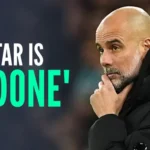Micah Richards believes £53m star could now be ‘a problem’ at Manchester City

Manchester City finds itself at a crossroads as the 2025-26 Premier League season approaches, grappling with defensive vulnerabilities that have become increasingly apparent following Kyle Walker’s departure to AC Milan. The club’s makeshift solution of deploying Matheus Nunes at right-back, while initially promising, has raised questions about long-term sustainability and tactical effectiveness against elite opposition. Former Manchester City defender Micah Richards has voiced concerns that the £53 million Portuguese midfielder could become “a problem” when facing superior attacking talent, highlighting a critical issue that manager Pep Guardiola must address before the new campaign begins.
The challenges facing Manchester City extend beyond individual personnel concerns, encompassing broader tactical and strategic questions about squad depth, positional versatility, and the club’s ability to maintain its high standards across multiple competitions. As the Citizens prepare for another demanding season, the right-back position has emerged as a focal point of debate, with implications that could significantly impact their domestic and European aspirations.
The Kyle Walker Legacy and Its Aftermath
Kyle Walker’s departure to AC Milan in January 2025 marked the end of an era for Manchester City. The English defender, who had been instrumental in the club’s success over nearly eight seasons, left behind a void that extends far beyond his defensive contributions. Walker’s unique combination of pace, attacking thrust, and defensive solidity made him one of the Premier League’s most complete full-backs, and his absence has forced Guardiola to reconsider his tactical approach.
During his time at the Etihad Stadium, Walker revolutionized the right-back position under Guardiola’s system. His ability to provide width in attack while maintaining defensive stability allowed City to dominate possession and create numerical advantages in the final third. The 34-year-old’s pace was particularly valuable in covering for the high defensive line that characterizes Guardiola’s tactical philosophy, enabling him to recover from advanced positions and neutralize counter-attacking threats.
Walker’s contribution to Manchester City’s success cannot be overstated. His presence in the team coincided with multiple Premier League titles, FA Cup victories, and the club’s first Champions League triumph in 2023. His understanding of Guardiola’s complex tactical demands, combined with his physical attributes and mental resilience, made him irreplaceable in many ways. The defender’s ability to seamlessly transition between defensive phases and attacking contributions exemplified the modern full-back role that has become increasingly important in contemporary football.
The circumstances surrounding Walker’s departure also highlighted the challenges facing aging players in Guardiola’s demanding system. While the defender remained physically capable, questions about his long-term future and the club’s succession planning became increasingly relevant. His move to AC Milan, while providing him with a new challenge, left Manchester City scrambling to find adequate cover for a position that had been stable for nearly a decade.
Matheus Nunes: The Unlikely Right-Back Solution
When Kyle Walker’s departure became imminent, few would have predicted that Matheus Nunes would emerge as his temporary replacement. The Portuguese midfielder, signed from Wolverhampton Wanderers for £53 million in 2023, had struggled to establish himself in City’s midfield, facing competition from established stars like Kevin De Bruyne, Bernardo Silva, and Rodri. However, necessity forced Guardiola to explore alternative options, and Nunes’ versatility presented an intriguing solution.
Nunes’ transition to right-back during the second half of the 2024-25 season surprised many observers, including the player himself. His background as a central midfielder provided him with technical skills and tactical awareness that differed from traditional full-backs, but these attributes also presented unique advantages. His comfort on the ball and ability to contribute to build-up play aligned well with Guardiola’s possession-based philosophy, while his work rate and defensive commitment exceeded initial expectations.
The Portuguese international’s performances in the unfamiliar position earned praise from teammates, coaches, and supporters. His ability to adapt to the physical demands of defending wide areas, combined with his natural athleticism, suggested that the positional switch might be more than a temporary fix. Nunes’ crossing ability and final-third delivery also improved throughout his time at right-back, adding another dimension to City’s attacking play.
However, the learning curve was steep, and Nunes’ adaptation process revealed both his strengths and limitations. His midfield background meant he sometimes struggled with the timing of defensive interventions, particularly when dealing with pacey wingers who could exploit his relative inexperience in one-on-one situations. Additionally, his positioning during defensive phases required constant adjustment, as the instincts developed as a midfielder did not always translate seamlessly to full-back responsibilities.
Despite these challenges, Nunes’ commitment to the role and his gradual improvement won over many skeptics. His performances during City’s push for Champions League qualification demonstrated his value to the team, even if questions remained about his long-term suitability for the position. The midfielder’s willingness to embrace the challenge and his professional approach to a difficult situation reflected well on his character and adaptability.
Micah Richards’ Analysis: The Problem with Better Opposition
Micah Richards, speaking on The Rest Is Football podcast, provided a nuanced assessment of Nunes’ performances and the challenges facing Manchester City. As a former City defender who experienced the demands of playing under pressure at the highest level, Richards’ perspective carries significant weight and insight into the complexities of the position.
Richards acknowledged Nunes’ improvement throughout the season, praising his defensive development and adaptation to an unfamiliar role. The pundit recognized the difficulty of asking a midfielder to perform full-back duties and credited Nunes with exceeding expectations in many areas. However, Richards also identified a crucial limitation that could prove problematic as City face elite opposition in the upcoming season.
The former England international’s concerns center on Nunes’ ability to handle one-on-one situations against world-class attackers. Richards emphasized that modern full-backs must be capable of defending in isolated situations, particularly when facing players who can create opportunities from minimal space and time. His reference to players like Trent Alexander-Arnold and Achraf Hakimi highlighted the evolution of the full-back position and the standards required at the highest level.
Richards’ analysis touched on the changing nature of defending in modern football, noting that the aggressive, physical approach that characterized previous generations has given way to more technical and positional challenges. The pundit’s observation that “football’s not like that right now” reflected the tactical evolution that has made defending more complex and demanding than ever before.
The former City defender’s concerns were validated by the team’s performance against Al-Hilal, where defensive transitions exposed vulnerabilities that could be exploited by superior opposition. Richards’ prediction that Nunes could become “a problem” when facing “better players who can hurt you in one-on-one situations” highlighted the risk of relying on a makeshift solution in such a crucial position.
The Al-Hilal Performance: A Warning Sign
Manchester City’s encounter with Al-Hilal in Orlando provided a stark reminder of the challenges facing the team’s defensive structure. The match, which took place during the club’s pre-season tour, exposed vulnerabilities in City’s ability to handle counter-attacks and defensive transitions, areas where Kyle Walker’s pace and positioning had previously provided crucial cover.
The performance highlighted several concerning patterns that had emerged throughout the previous season. City’s high defensive line, while effective in maintaining possession and creating attacking opportunities, left the team vulnerable to quick transitions and pacey attackers. Without Walker’s recovery pace and defensive instincts, these vulnerabilities became more pronounced and easier to exploit.
Bernardo Silva’s visible frustration with the team’s inability to control transitions reflected broader concerns within the squad about defensive stability. The Portuguese midfielder’s reaction suggested that the defensive issues were not merely isolated incidents but part of a systemic problem that required urgent attention. His experience and understanding of Guardiola’s tactical demands made his concerns particularly significant.
The Al-Hilal match also demonstrated the limitations of using Nunes as a long-term solution at right-back. While the Portuguese player showed commitment and effort, his positioning and decision-making in defensive phases revealed the gaps in his development as a full-back. The opposition’s ability to target his flank and create opportunities from wide areas illustrated the risks associated with persisting with a makeshift solution.
The timing of this performance, coming during pre-season preparations, provided Guardiola with valuable insights into areas requiring immediate attention. The match served as a wake-up call for the coaching staff and highlighted the urgency of addressing the right-back position before the competitive season begins.
Guardiola’s Tactical Dilemma
Pep Guardiola faces a complex tactical challenge as he prepares for the 2025-26 season. The manager’s commitment to his philosophical approach, combined with the practical demands of competing at the highest level, creates a delicate balance that must be maintained while addressing personnel limitations.
Guardiola’s tactical system relies heavily on full-backs who can contribute to both defensive stability and attacking creativity. The manager’s use of inverted full-backs, overlapping runs, and positional rotations requires players who possess exceptional technical ability, tactical intelligence, and physical attributes. Walker’s departure has disrupted this carefully calibrated system and forced Guardiola to explore alternative approaches.
The Spanish manager’s decision to deploy Nunes at right-back demonstrated his willingness to adapt and find creative solutions to personnel challenges. However, this flexibility also highlighted the limitations of the current squad and the need for targeted reinforcements. Guardiola’s preference for versatile players who can perform multiple roles has been a hallmark of his time at City, but the right-back position requires specialized skills that cannot be easily replicated.
The manager’s tactical philosophy also creates specific demands that go beyond traditional full-back responsibilities. His emphasis on possession-based play, positional flexibility, and defensive pressing requires players who can operate effectively in various phases of the game. The complexity of these demands makes finding suitable replacements even more challenging, as candidates must possess both the technical ability and tactical understanding to thrive in Guardiola’s system.
Guardiola’s track record of developing players and adapting tactical approaches provides reason for optimism, but the right-back position presents unique challenges that may require external solutions. The manager’s ability to identify and integrate new signings will be crucial in addressing the current vulnerabilities and maintaining City’s competitive standards.
The Transfer Market Challenge
Manchester City’s search for a new right-back in the summer transfer window faces several obstacles that complicate their pursuit of Walker’s replacement. The club’s financial constraints, following their recent legal challenges and the need to comply with Financial Fair Play regulations, limit their ability to pursue marquee signings without careful consideration of squad balance and long-term planning.
The modern transfer market’s inflation and the premium placed on proven full-backs make finding value difficult. Elite right-backs command substantial fees, and clubs are increasingly reluctant to part with their best defensive talent. City’s reputation and financial power provide advantages in negotiations, but competition from other top clubs creates additional challenges in securing their preferred targets.
The specific requirements of Guardiola’s system also narrow the pool of suitable candidates. Not all technically proficient full-backs possess the tactical intelligence and adaptability required to thrive in City’s complex tactical framework. The manager’s emphasis on possession retention, positional awareness, and defensive discipline eliminates many potential targets who might excel in different systems.
Young prospects represent an alternative approach, but their development timelines may not align with City’s immediate needs. The club’s academy system and scouting network provide access to emerging talent, but integrating young players into the first team requires patience and careful management. The pressure to compete for major trophies makes relying on untested prospects a risky strategy.
The timing of the transfer window also presents challenges, as clubs prefer to complete their business early to allow for proper integration and pre-season preparation. City’s pursuit of a right-back must balance the need for immediate solutions with long-term planning, ensuring that any new signing can contribute both in the upcoming season and beyond.
Rico Lewis: The Academy Alternative
Rico Lewis represents Manchester City’s homegrown solution to the right-back dilemma, but his development has been inconsistent and his performances have raised questions about his readiness for regular first-team football. The young defender’s emergence from the academy system provided initial optimism, but his struggles with form and consistency have limited his opportunities and highlighted the challenges facing young players in Guardiola’s demanding environment.
Lewis’ technical ability and understanding of City’s tactical principles made him an attractive option for the right-back position. His youth and energy, combined with his familiarity with the club’s playing style, suggested that he could develop into a long-term solution. However, his performances have been uneven, and his confidence appeared to suffer following several disappointing displays.
The pressure of replacing a player of Kyle Walker’s caliber has undoubtedly affected Lewis’ development. The young defender’s awareness of the expectations and scrutiny associated with the position may have contributed to his inconsistent performances. His need for regular playing time to develop his skills conflicts with City’s immediate requirement for reliable defensive stability.
Guardiola’s track record of developing young players provides hope for Lewis’ future, but the manager’s pragmatic approach to team selection suggests that the young defender must demonstrate significant improvement to secure regular opportunities. The competition for places and the high standards expected at City create additional pressure that young players must navigate successfully.
The club’s investment in Lewis’ development reflects their belief in his potential, but his current limitations highlight the challenges of relying on academy products to fill crucial positions. His journey serves as a reminder that player development is rarely linear and that patience and support are essential for young players to reach their potential.
The Broader Defensive Concerns
Manchester City’s right-back challenges are part of broader defensive concerns that have emerged following personnel changes and tactical adjustments. The team’s ability to defend transitions and maintain defensive stability has been compromised by the departure of key players and the integration of new tactical approaches.
The aging of certain squad members has created succession planning challenges that extend beyond the right-back position. City’s defensive core, which provided stability and leadership for several seasons, requires careful management and gradual renewal to maintain competitive standards. The club’s ability to balance experience with youth will be crucial in addressing these long-term challenges.
The tactical evolution of the game has also created new challenges for City’s defensive structure. The increasing pace and directness of modern attacking play requires defensive players who can adapt quickly and make split-second decisions under pressure. The complexity of these demands makes finding suitable replacements even more challenging.
City’s defensive record in recent seasons has remained strong, but subtle changes in performance levels suggest that proactive measures are necessary to maintain their standards. The club’s commitment to continuous improvement and tactical innovation requires constant evaluation and adjustment of personnel and systems.
The interconnected nature of defensive play means that weaknesses in one area can affect the entire system. City’s pursuit of solutions to their right-back challenges must consider the broader implications for team balance and tactical coherence.
Looking Ahead: Solutions and Strategies
As Manchester City prepares for the 2025-26 season, several potential solutions to their right-back dilemma emerge, each with distinct advantages and challenges. The club’s approach to addressing this position will likely influence their tactical setup and competitive prospects for the upcoming campaign.
The most direct solution involves pursuing an established right-back in the transfer market. This approach would provide immediate stability and allow Guardiola to maintain his preferred tactical approach without significant adjustments. However, the financial and practical challenges associated with such signings require careful consideration and strategic planning.
Alternatively, City could continue developing their internal options, providing increased opportunities for Rico Lewis while maintaining Matheus Nunes as a viable alternative. This approach would require patience and acceptance of potential inconsistencies, but it could yield long-term benefits if the young players fulfill their potential.
A hybrid approach, combining targeted signings with continued development of existing players, may represent the most balanced solution. This strategy would provide immediate reinforcement while maintaining options for the future, allowing the club to adapt to changing circumstances and player development trajectories.
The club’s decision-making process will likely consider factors beyond immediate tactical requirements, including financial constraints, squad dynamics, and long-term planning objectives. The integration of new signings and the development of existing players must align with the club’s broader strategic goals and competitive ambitions.
Conclusion
Manchester City’s right-back situation represents a microcosm of the challenges facing elite clubs in the modern game. The departure of Kyle Walker has created a void that extends beyond individual contributions, affecting tactical balance, defensive stability, and strategic planning. Matheus Nunes’ admirable efforts to fill this gap have provided temporary relief but highlighted the limitations of makeshift solutions against elite opposition.
Micah Richards’ analysis of Nunes’ potential problems when facing superior attackers reflects broader concerns about the club’s defensive readiness for the upcoming season. The former City defender’s insights, based on his experience at the highest level, provide valuable perspective on the demands and expectations associated with the position.
The Al-Hilal performance served as a timely reminder of the vulnerabilities that can emerge when defensive systems are compromised. The match highlighted the importance of addressing these issues before the competitive season begins, emphasizing the urgency of finding sustainable solutions to the right-back challenge.
Guardiola’s tactical genius and adaptability provide reasons for optimism, but the manager’s ability to find creative solutions must be balanced against the practical demands of competing at the highest level. The club’s approach to addressing their defensive concerns will significantly influence their prospects for the upcoming season and beyond.
As Manchester City navigates this challenging period, their ability to maintain competitive standards while addressing personnel limitations will test the depth of their squad and the effectiveness of their strategic planning. The resolution of their right-back dilemma will serve as an important indicator of the club’s continued evolution and ambition in the modern game.
The upcoming season will provide answers to many of these questions, but City’s proactive approach to addressing their challenges suggests that they remain committed to maintaining their position among the world’s elite clubs. Their ability to adapt, evolve, and overcome obstacles will determine their success in the months and years ahead.















